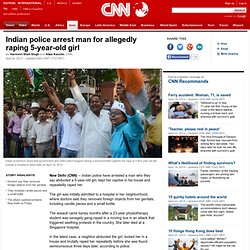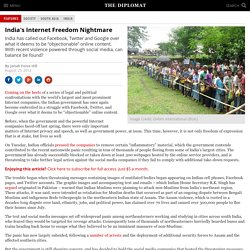

Five arrested in alleged gangrape of Japanese tourist. Anti-rape jeans and bra: Indian college girls invent range of security gear. It Is Now Perfectly Legal to Rape Your Wife in This Country. A case just decided in the Indian court system has once again highlighted the grave and challenging problem of marital rape in the country.

On Tuesday, a Delhi judge ruled that rape laws do not apply to married couples; once a man and woman are legally wed, forced sex is no longer a crime. The details of the case are these: Last year, a 21-year-old woman who lived near New Delhi accused a man of drugging her, getting her to sign marriage documents and then having sex with her while she was intoxicated.
Though this case has been challenged because of alleged inconsistencies in the woman's account, as well as a lack of evidence, the ruling makes India's official line on marital rape very clear: The prosecutrix (the wife) and the accused being legally wedded husband and wife, and the prosecutrix being major, the sexual intercourse between the two, even if forcible, is not rape and no culpability can be fastened upon the accused. Image Credit: United Nation's Women Progress Report Smriti Sinha. Indian police arrest man for allegedly raping 5-year-old girl - CNN.com - Pale Moon. By Harmeet Shah Singh and Aliza Kassim, CNN April 20, 2013 -- Updated 0923 GMT (1723 HKT) Indian protestors shout anti-government and Delhi police slogans during a demonstration against the rape of a five-year old girl, outside a hospital in New Delhi on April 19, 2013 Doctors say they removed foreign objects from her genitalsThey included candle pieces and a small bottleThe attack sparked protests New Delhi on Friday.

À Goa, les enfants de hippies moins idéalistes que leurs parents - Inde - RFI - Pale Moon. Le sable caresse la plante des pieds, la brise de fin d’après-midi souffle légèrement et aucun nuage ne se profile à l’horizon.

Au loin, on entend déjà le rythme de la musique électronique qui sort d’un bar de plage et annonce une nouvelle soirée de fête, en ce jeudi de février. Quarante ans après l’arrivée des premiers hippies, Goa continue à envoûter ses visiteurs. Des racines fortement ancrées à Goa Joy, torse costaud et peau bronzée, vous salue avec un sourire large et joyeux. Il abandonne pour quelques instants sa partie de beach volley et vous entraîne d’une démarche nonchalante vers le Shiva Place, bar central de la plage mythique de Vagator, dans le nord de l’Etat de Goa. Parmi eux se trouvaient les parents de Joy, un Autrichien et une Française. « Mon père est venu pour la première fois à Goa en 1976, dans un mini-bus de hippies, à travers l’Iran et l’Afghanistan. Un environnement qui ne l’a cependant pas motivé à poursuivre des études universitaires. Mass demonstrations in India as anger over sexual violence reaches boiling point (PHOTOS)
Le droit de se voiler. India’s Internet Freedom Nightmare. India has called out Facebook, Twitter and Google over what it deems to be “objectionable” online content.

With recent violence powered through social media, can balance be found? By Jonah Force Hill for The Diplomat August 25, 2012 Coming on the heels of a series of legal and political confrontations with the world’s largest and most prominent Internet companies, the Indian government has once again become embroiled in a struggle with Facebook, Twitter, and Google over what it deems to be “objectionable” online content. Before, when the government and the powerful Internet companies faced-off last spring, there were only important matters of Internet privacy and speech, as well as government power, at issue.
On Tuesday, Indian officials pressed the companies to remove certain “inflammatory” material, which the government contends contributed to the recent nationwide panic resulting in tens of thousands of people fleeing from some of India’s largest cities. Enjoying this article? India Bans Mass SMS to Counter Panic - India Real Time. L'Inde annonce le bannissement des domaines en .xxx.
Q&A with Founder of 'I Paid a Bribe,' India's Anti-Corruption Online Movement. India is one of the fastest growing economies in the world, with an average GDP growth of about 9 percent over the past several years.

Yet corruption remains a pressing problem in the nation of 1.2 billion – Transparency International ranked India 87th out of 178 countries on perceptions of transparency and integrity last year – and a serious drag on the economy and society at large. Meanwhile, the Jan Lokpal Bill, an anti-corruption proposal which has received significant public support and media attention in recent months, reveals a society that is increasingly frustrated over the corruption they see their government representatives engaged in.
Ordinary citizens are increasingly raising their voice through innovative social media outlets like ipaidabribe.com, a website that allows citizens to report bribes they were forced to pay. The public response has been overwhelming, with over 14,300 reports across 453 cities and 21 governmental departments recorded since it started in 2010. I PAID A BRIBE.